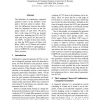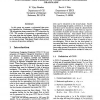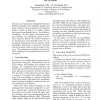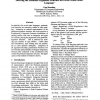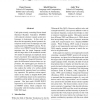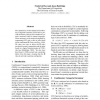120
Voted
ACL
2010
15 years 11 days ago
2010
The definition of combinatory categorial grammar (CCG) in the literature varies quite a bit from author to author. However, the differences between the definitions are important i...
108
Voted
ACL
2010
15 years 11 days ago
2010
Combinatory Categorial Grammar (CCG) is generally construed as a fully lexicalized formalism, where all grammars use one and the same universal set of rules, and crosslinguistic v...
151
click to vote
ACL
1990
15 years 3 months ago
1990
In this paper we present a polynomial time parsing algorithm for Combinatory Categorial Grammar. The recognition phase extends the CKY algorithm for CFG. The process of generating...
106
Voted
ACL
1990
15 years 3 months ago
1990
In this paper, we report on our use of zero morphemes in Unification-Based Combinatory Categorial Grammar. After illustrating the benefits of this approach with several examples, ...
102
click to vote
NAACL
1994
15 years 3 months ago
1994
This paper presents a model for generating prosodically appropriate synthesized responses to database queries using Combinatory Categorial Grammar (CCG - cf. [22]), a formalism wh...
102
Voted
COLING
2000
15 years 3 months ago
2000
The Korean Combinatory Categorial Grammar (KCCG) tbrmalism can unitbrmly handle word order variation among arguments and adjuncts within a clause as well as in complex clauses and...
100
click to vote
ACL
1998
15 years 3 months ago
1998
In relatively free word order languages, grammatical functions are intricately related to case marking. Assuming an ordered representation of the predicate-argument structure, thi...
107
click to vote
EMNLP
2007
15 years 3 months ago
2007
We consider the problem of learning to parse sentences to lambda-calculus representations of their underlying semantics and present an algorithm that learns a weighted combinatory...
137
Voted
ACL
2007
15 years 3 months ago
2007
Until quite recently, extending Phrase-based Statistical Machine Translation (PBSMT) with syntactic structure caused system performance to deteriorate. In this work we show that i...
105
Voted
ACL
2008
15 years 3 months ago
2008
The standard set of rules defined in Combinatory Categorial Grammar (CCG) fails to provide satisfactory analyses for a number of syntactic structures found in natural languages. T...
